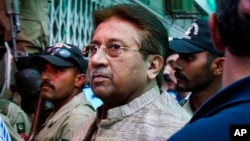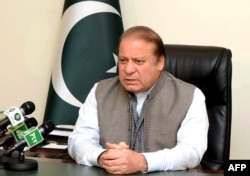A special court in Pakistan hearing treason charges against former military president Pervez Musharraf Tuesday ordered authorities to freeze his bank accounts as well as seize his property anywhere in the country.
The three-member panel of judges cited Musharraf’s continued personal absence in the high-treason trial despite repeated notices.
The former Pakistani leader left the country in March after a provincial court allowed him to travel abroad for medical treatment, a ruling the Supreme Court later upheld.
Hearing adjourned
During Tuesday’s proceedings, the special court also instructed authorities to submit as soon as possible “a compliance report” of its orders and adjourned the hearing until Musharraf is arrested or he surrenders to appear before the panel and answer the treason charges.
The chief judge rejected as illegal a prosecution plea that the trial could proceed in Musharraf’s absence, suggesting medical reasons are made up as delaying tactics.
A lead defense lawyer, Ahmad Raza Kasuri, explained to VOA that though prosecutors have concluded their arguments in the case, laws have bound the court not to proceed further until the accused personally answers the charges.
“They are keen to get a verdict that he [Musharraf] has committed a high treason. That verdict cannot be obtained till case is concluded, so the court said we cannot proceed unless we record the statement of the accused in the court and signed [by him] before the court,” said Kasuri.
Other legal challenges
The high-profile treason case dates back to 2007 when Musharraf, president and military chief of Pakistan at the time, imposed a brief emergency rule and suspended the constitution in a bid to cling to power in the face of growing public demands for him to step down.
The former Pakistani leader, who also faces several other legal challenges stemming from his days in power, rejects the charges as politically motivated.
Musharraf took power in a bloodless military coup in 1999 by ousting the government of then prime minister, Nawaz Sharif whom he later exiled to Saudi Arabia along with his family members.
The 2013 parliamentary elections returned Sharif to power and Musharraf's supporters allege the pace of judicial cases against the former president also has since picked up.






